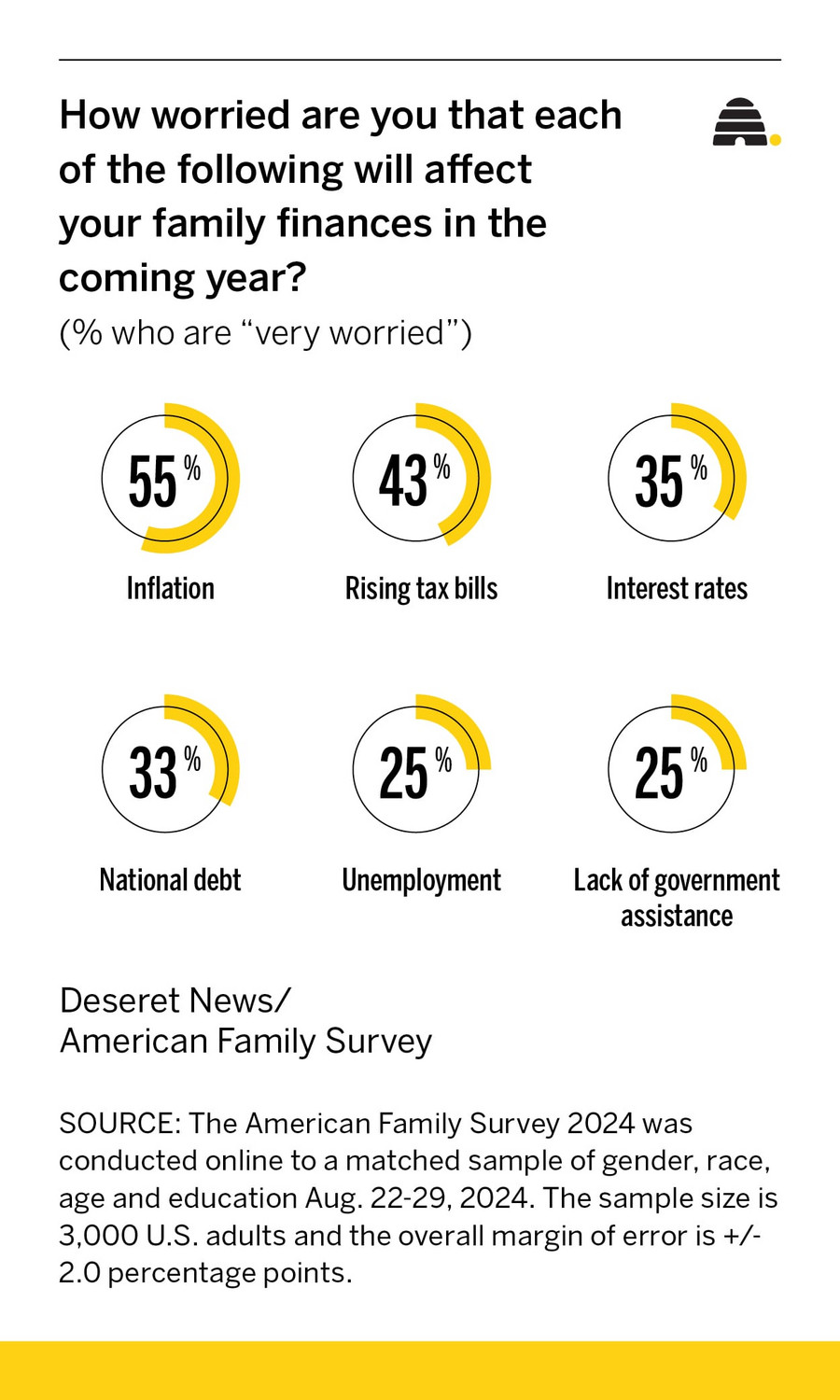Estimated read time: 5-6 minutes

SALT LAKE CITY — In its 10-year history, the American Family Survey has always asked about people's economic worries. But the question is perhaps more important than usual in a year when citizens are poised to elect a president. So what's top of mind in terms of how families are viewing their finances and the economy in general?
"Inflation" is the clear answer, with more than 55% of responding adults calling themselves very worried. Nothing else comes close.
Add in the number who say they are somewhat worried about inflation and the tally reaches 88% of respondents — "as close to universal as things get in survey research," write Brigham Young University political science professors Chris Karpowitz and Jeremy C. Pope, who have been the survey's investigators for its entire decade-long run. That's far ahead of the number who say they're "very worried" about rising tax bills (43%), interest rates (35%), the national debt (33%) and unemployment and lack of government assistance, which both come in at 25%.
The American Family Survey is a nationally representative study conducted by YouGov for BYU's Wheatley Institute, BYU's Center for the Study of Elections and Democracy and Deseret News. YouGov fielded the study Aug. 22-29 with 3,000 respondents, and it has an error margin of plus or minus 2 percentage points.
The question is: Will people vote — or have they already done so — based on their inflation worries? And how much does the president actually influence inflation, said Pope, who's also a constitutional government fellow at the Wheatley Institute.

In the survey, there was no close second and when the results were analyzed by factors that might impact how people feel — demographics like race, church attendance, gender, family status — most didn't change what worried folks, which spanned income levels, though those with household income levels above $100,000 were the least worried about inflation compared to those in middle- and low-income groups. As the survey report noted, "Rising ground beef prices are harder to absorb on an income of $35,000 a year."
The survey found that fewer than half with household incomes above $100,000 are very worried (43%) about inflation, while nearly 40% are still somewhat worried. But roughly 90% of those making less are at least somewhat worried — and roughly 60% said they're very worried. The "not worried" group includes 17% of the higher-income group and 10% to 11% of the lower-income group.
The entire 2024 American Family Survey will be released in early December, but the economic findings were released early due to the election. Now's the time to look at factors driving how people vote — and the survey makes clear that the cost of living is top of mind.
Worrying in a partisan way?
The inflation rate has actually been dropping recently, but Pope thinks people might be feeling it more because of the prolonged period of low inflation that came before inflation shot up after the COVID-19 pandemic.

In any election year, partisanship, not surprisingly, matters. And it looms large in this question as well. Republicans cite inflation as a worry at much higher rates (68%) than Democrats (41%). It's not that Republicans and Democrats are differently affected by inflation or prices, Pope and Karpowitz told Deseret News. Rather, Republicans are "just more motivated to give this response."
Pope said the fact that Democrat Joe Biden is in the White House prompts some Republicans to criticize the current economy, while if a Republican was in the White House they might focus on other issues.
Still, Pope and Karpowitz said it's clear from the survey results that Democrats, too, believe inflation is the top economic concern. Just 22% of Democrats are very worried about unemployment, while 27% are very worried about interest rates and just 20% about the national debt, though some economists and elected officials have bluntly said that's the economic issue of our age.
"All of the economic data says that inflation has declined considerably," said Karpowitz, who is also a senior scholar at the Center for the Study of Elections and Democracy. "But its effects linger and it seems to be a significant worry for a majority of Americans and more worrisome to them than a variety of other economic issues. I think that's quite notable."
To verify inflation as the top concern, the survey also asked if people think that in the next couple of years their household income will keep up with prices. Just 23% think they'll keep up, while more than half figure their personal incomes will lag behind.
Parents were more apt than those without children to predict they'll fall behind — an eight-point difference the researchers said "bears watching."
Karpowitz calls it a "very common thing we see especially around the time of an election, when people are reminded of their partisan loyalties and what happens is that people view the economy to some extent through those lenses."
Republicans have been emphasizing the negatives of the economy and Democrats have been saying inflation has come down and economic indicators look pretty good, he said.
Does the president impact inflation?
Neither Pope nor Karpowitz see a strong case for hanging blame for inflation on a president, regardless of political affiliation. Inflation can result from supply chain issues or a number of other issues, like the amount of money spent during COVID under two different presidents of two different parties. "If I were going to pick an institution, it would be the Federal Reserve, but I suspect it was difficult to keep a lid on inflation coming out of COVID," Pope said.









